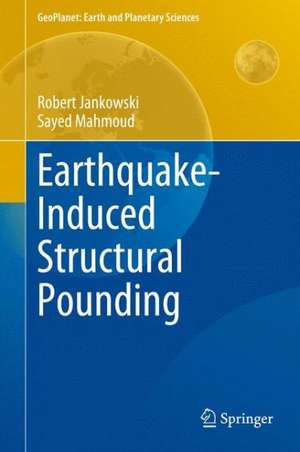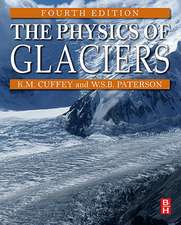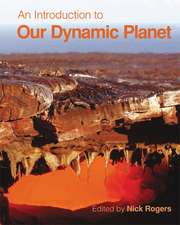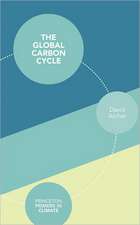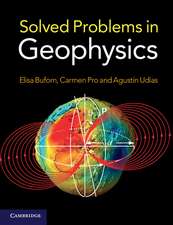Earthquake-Induced Structural Pounding: GeoPlanet: Earth and Planetary Sciences
Autor Robert Jankowski, Sayed Mahmouden Limba Engleză Hardback – 27 mar 2015
Earthquake-induced structural pounding between insufficiently separated buildings, and between bridge segments, has been repeatedly observed during ground motions. The reports after earthquakes indicate that it may result in limited local damage in the case of moderate seismic events, or in considerable destruction or even the collapse of colliding structures during severe ground motions. Pounding in buildings is usually caused by the differences in dynamic properties between structures, which make them vibrate out-of-phase under seismic excitation. In contrast, in the case of longer bridge structures, it is more often the seismic wave propagation effect that induces collisions between superstructure segments during earthquakes.
| Toate formatele și edițiile | Preț | Express |
|---|---|---|
| Paperback (1) | 381.00 lei 6-8 săpt. | |
| Springer International Publishing – 6 oct 2016 | 381.00 lei 6-8 săpt. | |
| Hardback (1) | 388.13 lei 6-8 săpt. | |
| Springer International Publishing – 27 mar 2015 | 388.13 lei 6-8 săpt. |
Din seria GeoPlanet: Earth and Planetary Sciences
- 18%
 Preț: 1395.63 lei
Preț: 1395.63 lei - 18%
 Preț: 970.87 lei
Preț: 970.87 lei - 15%
 Preț: 643.34 lei
Preț: 643.34 lei - 18%
 Preț: 898.89 lei
Preț: 898.89 lei - 15%
 Preț: 653.65 lei
Preț: 653.65 lei - 18%
 Preț: 730.97 lei
Preț: 730.97 lei - 15%
 Preț: 641.03 lei
Preț: 641.03 lei - 18%
 Preț: 945.79 lei
Preț: 945.79 lei - 15%
 Preț: 653.98 lei
Preț: 653.98 lei - 15%
 Preț: 633.53 lei
Preț: 633.53 lei - 15%
 Preț: 635.96 lei
Preț: 635.96 lei - 18%
 Preț: 956.03 lei
Preț: 956.03 lei -
 Preț: 418.07 lei
Preț: 418.07 lei - 15%
 Preț: 633.02 lei
Preț: 633.02 lei - 18%
 Preț: 1233.69 lei
Preț: 1233.69 lei - 15%
 Preț: 639.90 lei
Preț: 639.90 lei - 15%
 Preț: 641.71 lei
Preț: 641.71 lei - 18%
 Preț: 967.40 lei
Preț: 967.40 lei - 15%
 Preț: 640.06 lei
Preț: 640.06 lei - 15%
 Preț: 642.68 lei
Preț: 642.68 lei - 15%
 Preț: 639.90 lei
Preț: 639.90 lei - 15%
 Preț: 638.43 lei
Preț: 638.43 lei - 15%
 Preț: 643.34 lei
Preț: 643.34 lei - 20%
 Preț: 574.08 lei
Preț: 574.08 lei - 15%
 Preț: 640.06 lei
Preț: 640.06 lei - 15%
 Preț: 642.83 lei
Preț: 642.83 lei - 15%
 Preț: 643.65 lei
Preț: 643.65 lei - 15%
 Preț: 642.51 lei
Preț: 642.51 lei - 15%
 Preț: 640.88 lei
Preț: 640.88 lei - 18%
 Preț: 948.47 lei
Preț: 948.47 lei - 18%
 Preț: 1260.20 lei
Preț: 1260.20 lei - 15%
 Preț: 632.88 lei
Preț: 632.88 lei
Preț: 388.13 lei
Nou
Puncte Express: 582
Preț estimativ în valută:
74.27€ • 79.42$ • 61.92£
74.27€ • 79.42$ • 61.92£
Carte tipărită la comandă
Livrare economică 18 aprilie-02 mai
Preluare comenzi: 021 569.72.76
Specificații
ISBN-13: 9783319163239
ISBN-10: 331916323X
Pagini: 200
Ilustrații: XV, 156 p. 127 illus., 7 illus. in color.
Dimensiuni: 155 x 235 x 17 mm
Greutate: 0.42 kg
Ediția:2015
Editura: Springer International Publishing
Colecția Springer
Seria GeoPlanet: Earth and Planetary Sciences
Locul publicării:Cham, Switzerland
ISBN-10: 331916323X
Pagini: 200
Ilustrații: XV, 156 p. 127 illus., 7 illus. in color.
Dimensiuni: 155 x 235 x 17 mm
Greutate: 0.42 kg
Ediția:2015
Editura: Springer International Publishing
Colecția Springer
Seria GeoPlanet: Earth and Planetary Sciences
Locul publicării:Cham, Switzerland
Public țintă
ResearchCuprins
Introduction.- Modelling of Structural Pounding.- Pounding between Buildings.- Pounding between Bridge Segments.- Mitigation of Pounding Effects.- Design of Structures Prone to Pounding.
Textul de pe ultima copertă
This books analyzes different approaches to modeling earthquake-induced structural pounding and shows the results of the studies on collisions between buildings and between bridge segments during ground motions. Aspects related to the mitigation of pounding effects as well as the design of structures prone to pounding are also discussed.
Earthquake-induced structural pounding between insufficiently separated buildings, and between bridge segments, has been repeatedly observed during ground motions. The reports after earthquakes indicate that it may result in limited local damage in the case of moderate seismic events, or in considerable destruction or even the collapse of colliding structures during severe ground motions. Pounding in buildings is usually caused by the differences in dynamic properties between structures, which make them vibrate out-of-phase under seismic excitation. In contrast, in the case of longer bridge structures, it is more often the seismic wave propagation effect that induces collisions between superstructure segments during earthquakes.
Earthquake-induced structural pounding between insufficiently separated buildings, and between bridge segments, has been repeatedly observed during ground motions. The reports after earthquakes indicate that it may result in limited local damage in the case of moderate seismic events, or in considerable destruction or even the collapse of colliding structures during severe ground motions. Pounding in buildings is usually caused by the differences in dynamic properties between structures, which make them vibrate out-of-phase under seismic excitation. In contrast, in the case of longer bridge structures, it is more often the seismic wave propagation effect that induces collisions between superstructure segments during earthquakes.
Caracteristici
Presents a comprehensive summary of structural pounding observed during earthquakes Includes a special chapter on the mitigation of pounding effects Shares insights into aspects of seismic design for structures prone to pounding Includes supplementary material: sn.pub/extras
